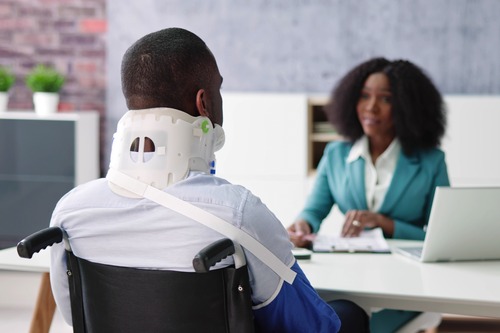Protect Your Rights After a Spinal Cord Injury
A spinal cord injury is one of the most devastating injuries a worker can face, often resulting in life-altering consequences. Whether caused by a fall, vehicle-related accident, or improper lifting while on the job, a spinal cord injury can lead to permanent disabilities, substantial medical costs, and significant emotional trauma. In Georgia, workers who sustain spinal cord injuries are entitled to workers’ compensation benefits designed to support their recovery and provide financial relief.
Understanding this process following such a severe injury can be overwhelming. We can help you by explaining what benefits are available, how to file a claim, and what steps to take to protect your rights.
Let’s explore workers’ comp benefits that are associated with spinal cord injuries, and why it’s highly recommended that you seek legal guidance from an experienced workers’ compensation lawyer.
What Is a Spinal Cord Injury and How Does It Occur?
A spinal cord injury occurs when trauma leads to a loss of mobility, sensation, and even function below the portion of the affected spine. This type of workplace injury can be categorized as complete or incomplete.
Complete injuries result in a total loss of function below the injury level.
Incomplete injuries leave some level of function intact.
Spinal cord injuries can occur in many workplace accidents, often caused by:
Falls, especially in construction or warehouse settings.
Vehicle accidents, such as crashes involving delivery trucks or forklifts.
Repetitive motion injuries that result in severe strain on the back and spine.
Heavy lifting or improper body mechanics while handling equipment.
In all of these cases, workers suffering from a spinal cord injury may face ongoing medical treatment, rehabilitation, and potential long-term care.
Types of Benefits Available Through Workers’ Compensation for a Spinal Cord Injury
Workers who suffer a spinal cord injury on the job are entitled to a range of workers’ compensation benefits under Georgia law. These benefits are designed to help cover medical treatment, replace lost wages, and provide long-term financial security.
1. Medical Benefits
Medical benefits cover the cost of treatments related to your spinal cord injury, including:
Emergency medical care.
Surgery and hospitalization.
Physical therapy and rehabilitation.
Prescription medications and durable medical equipment (such as wheelchairs).
It’s important to keep detailed records of all medical treatments and prescriptions to make sure that your workers’ compensation claim fully covers these costs.
2. Temporary Total Disability (TTD) Benefits
If you are unable to work due to your spinal cord injury, you may qualify for temporary total disability (TTD) benefits. TTD benefits replace a portion of your lost wages while you are temporarily unable to perform your job duties.
In Georgia, TTD benefits typically amount to two-thirds of your average weekly wage, subject to a maximum set by the state. These benefits continue until you are able to return to work, or until your treating physician determines that you have reached maximum medical improvement(MMI), meaning you have recovered as much as possible.
3. Permanent Partial Disability (PPD) and Lifetime Temporary Total Disability (TTD) Benefits
If your spinal cord injury results in permanent disability, you may qualify for either permanent partial disability or lifetime temporary total disability (also referred to as permanent total disability in other states). These are designed to provide ongoing financial support if you are permanently unable to return to your job, or if you can no longer perform your prior job duties.
PPD benefits are awarded if you can still work but with limitations, while TTD benefits are for workers who cannot return to work at all due to the severity of the injury.
4. Vocational Rehabilitation Benefits
If your spinal cord injury prevents you from returning to your previous line of work, you may be eligible for vocational rehabilitation benefits. These benefits can help you retrain for a new job, including job placement services, education, and skills training.
Vocational rehabilitation ensures that workers who suffer long-term disabilities can still support themselves and their families, even if they cannot return to their previous employment.
5. Death Benefits
In tragic cases where a spinal cord injury leads to death, surviving family members may be entitled to death benefits under Georgia’s workers’ compensation law. These benefits can include compensation for funeral expenses, as well as a portion of the deceased worker’s wages to support surviving family members.
Essential Workers’ Compensation Benefits for Spinal Cord Injuries
After a spinal cord injury, the first step in determining the level of benefits you’ll receive is to consult with a healthcare provider under your employer’s workers’ comp plan. That doctor will assess the severity of the injury, determine your treatment plan, and provide an impairment rating to assess the degree of disability.
The Georgia State Board of Workers’ Compensation (SBWC) then uses this rating, along with the details of your medical records, to calculate the amount of benefits you’re entitled to receive. If your case involves a permanent disability, the SBWC will determine whether you qualify for PPD or PTD benefits, based on the severity of your injury and how it impacts your ability to work.
It’s essential to have an experienced workers’ compensation attorney who understands how to properly calculate your benefits and verify that you receive fair compensation for all medical expenses, lost wages, and long-term care needs.
Challenges in Securing Workers’ Compensation for Spinal Cord Injuries
Securing workers’ compensation benefits after a spinal cord injury can be complicated, and there are several challenges that may creep up during the claims process.
Disputes over liability: There’s disagreement about whether your injury occurred while at work.
Medical disputes: Insurers question the medical necessity of certain treatments, or challenge the severity of your injury.
Claim denials: The insurer denies your claim entirely, forcing you to file an appeal or seek legal action.
Working with our law offices can help resolve these issues quickly and efficiently so that you receive the benefits you need for your recovery.
Get Experienced Legal Representation for Your Spinal Cord Injury
Navigating workers’ comp after a spinal cord injury can be a complex, frustrating process. Having an experienced attorney by your side can make all the difference by:
Helping you understand the full extent of your rights and benefits.
Guiding you through the paperwork and filing process.
Negotiating with the insurance company on your behalf.
Representing you in court if your claim is denied or disputed.
At the Law Offices of Humberto Izquierdo, Jr., PC, we have extensive experience representing clients throughout Georgia who have suffered spinal cord injuries. We are committed to fighting for your rights and ensuring that you receive the full compensation that you deserve.
Steps to Take After a Spinal Cord Injury at Work
If you’ve sustained a spinal cord injury at work, it’s important to take the following steps to protect your rights.
Report the Injury Immediately: Notify your employer as soon as possible after the injury occurs.
Seek Medical Attention: Get checked by a workers’ comp plan-approved medical professional right away to ensure the injury is properly diagnosed and documented.
File a Workers’ Compensation Claim: File the necessary paperwork to start the claims process.
Consult a Workers’ Compensation Lawyer: Reach out to an attorney to ensure your claim is handled properly and to help secure the benefits you deserve.
Get the Legal Help You Need
If you or a loved one has suffered a spinal cord injury at work in the state of Georgia, you don’t have to go through this challenging process alone. The Law Offices of Humberto Izquierdo, Jr., PC is here to help guide you through every step of the workers’ compensation process and ensure that you receive the compensation you need for your medical expenses, lost wages, and long-term care.
Contact us online or by phone at (770) 888-8901 for a free consultation to discuss your case.




